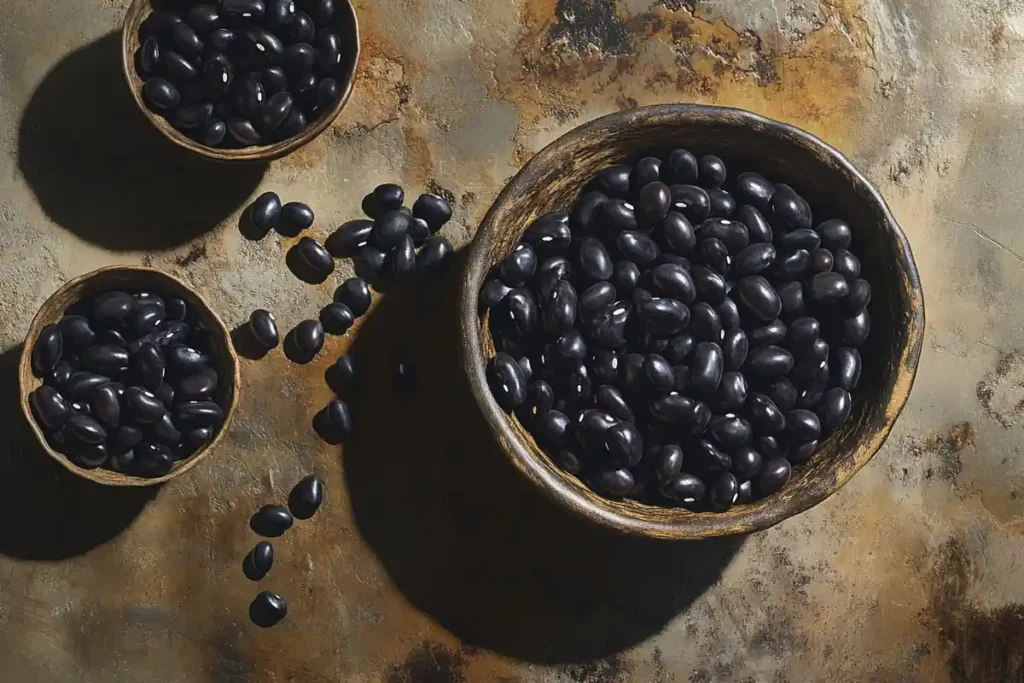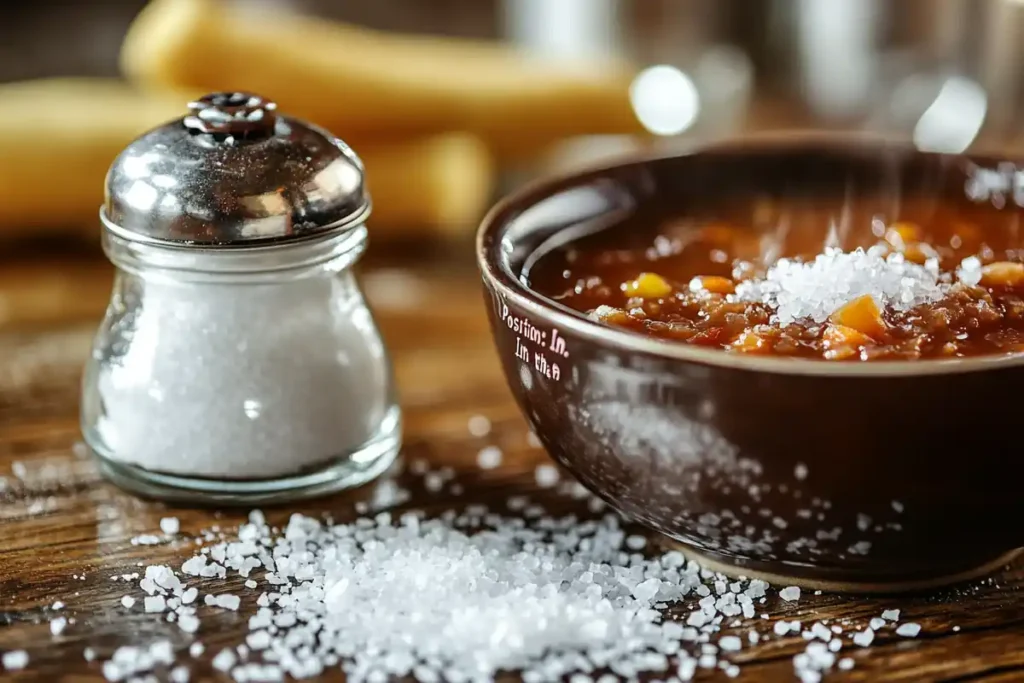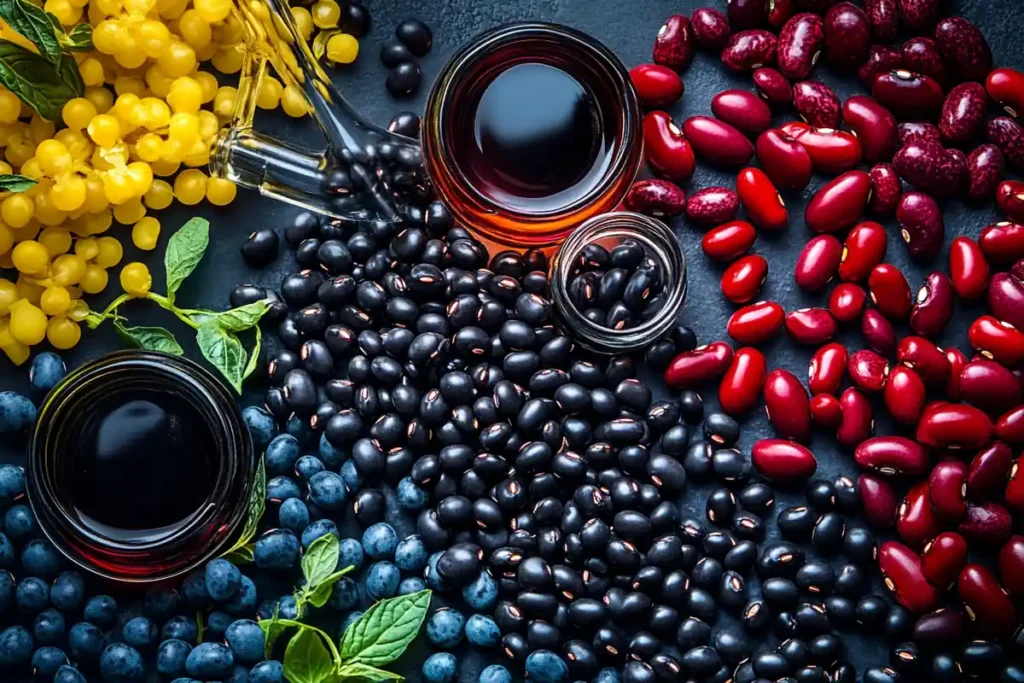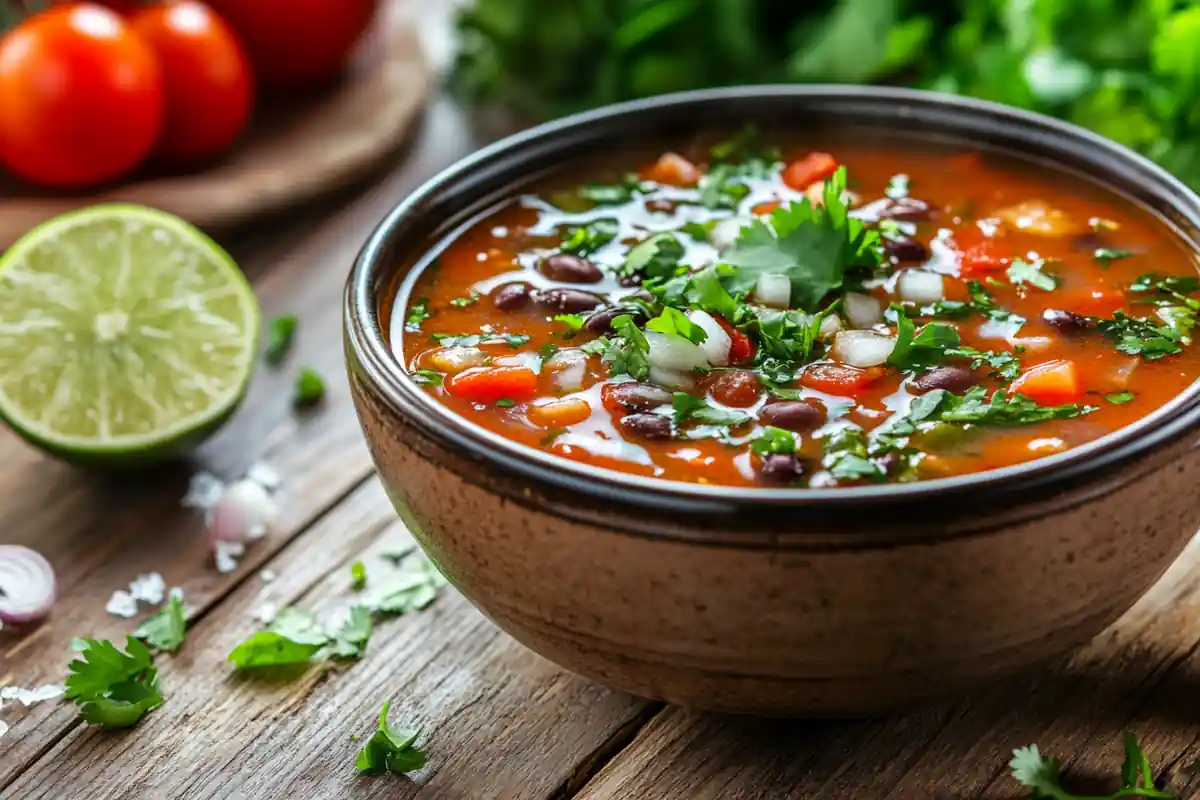introduction
A close-up of a steaming bowl of black bean soup, with vibrant colors highlighting fresh ingredients like diced tomatoes, cilantro, and chopped onions. Include visual elements that symbolize solutions to bitterness, such as a squeeze of lime, a sprinkle of sugar, and fresh herbs arranged artfully around the bowl. The setting is warm and inviting, with a rustic wooden table and soft lighting that enhances the rich textures of the soup.
Making a tasty black bean soup can be tricky, often due to unexpected bitterness. You might find yourself wondering why your soup isn’t as smooth and flavorful as you wanted.
For those who love black bean soup, getting the flavor just right is key. Bitterness can come from the beans themselves, how you cook them, or how ingredients mix. Knowing these details can make your soup taste better.
The bright side is that fixing bitter taste issues is often easy. Whether you’re using dried or canned black beans, mastering flavor challenges can boost your cooking. This ensures your soup always tastes great.
In this guide, we’ll show you how to turn a potentially bitter black bean soup into a dish everyone will love. We’ll cover everything from choosing the right beans to cooking techniques. You’ll learn how to avoid and fix bitterness, making your soup delicious every time.
Understanding the Science Behind Bean Bitterness
Black beans are complex ingredients that can surprise home cooks with unexpected taste profiles. The journey from raw beans to delicious soup involves complex chemical reactions. These reactions shape the flavor of the beans.

“An artistic representation of black beans with a focus on their chemical composition, showcasing molecular structures and compounds like flavonoids and tannins, surrounded by vibrant colors and textures of the beans, emphasizing the intricate details of legume chemistry.”
Natural Compounds in Black Beans
Black beans have several natural compounds that can make them taste bitter. These include:
- Tannins – natural plant-based chemicals
- Phenolic compounds
- Saponins
Chemical Reactions During Cooking
Cooking black beans triggers fascinating chemical changes. The Maillard reaction, which happens between amino acids and sugars, can create both good and bad flavors.
| Cooking Factor | Bitterness Impact |
|---|---|
| High Heat | Increases Bitter Compounds |
| Overcooking | Releases More Tannins |
| Extended Simmering | Can Mellow Bitter Notes |
How Storage Effects Bean Taste
Storage conditions greatly affect black beans’ taste. Bad storage can make them taste bitter. Store beans in cool, dry places to keep their flavor good.
Understanding bean chemistry helps transform bitterness into culinary delight.
The Role of Salt in Preventing Bitter Taste Bitter

A close-up view of a steaming bowl of black bean soup, vibrant colors showcasing the rich black beans and garnishes like cilantro and diced onions, with a coarse salt shaker beside it, glistening crystals of salt scattered artistically around, emphasizing its role in enhancing flavors. The background is softly blurred, highlighting the soup as the focal point.
Salt is more than just a seasoning. It’s key to making your black bean soup taste great. The sodium in salt blocks bitter tastes, making your soup more enjoyable.
Learning how salt affects taste can make your soup better. Here’s how it works:
- Blocks bitter taste receptors on your tongue
- Enhances overall flavor complexity
- Neutralizes harsh or sharp taste notes
- Helps blend ingredient flavors more smoothly
Flavor enhancement is not just about saltiness. It’s about creating a harmonious taste experience. Adding salt to your soup is like conducting a culinary symphony. It balances and elevates all the flavors.
“Salt is the difference between a good dish and a great one.” – Professional Chef Wisdom
The trick is to use salt wisely. A little salt can turn a bland soup into a rich, satisfying dish. Here are some tips for using salt:
- Add salt gradually during cooking
- Taste as you go
- Use kosher or sea salt for deeper flavor
- Remember that canned beans may already contain sodium
By understanding salt’s role, you can make a perfectly balanced black bean soup. It will delight your taste buds.
Common Causes of Bitterness in Black Bean Soup
Finding out why your black bean soup tastes bitter can be tough. Knowing what makes it taste bad helps make it better.
Bean Quality Matters
Good black bean soup starts with the beans. Old or bad beans can make your soup taste bitter. Here’s how to pick the right beans:
- Purchase beans from reputable sources
- Check for freshness and consistent color
- Store beans in a cool, dry place
- Avoid beans with signs of moisture or discoloration

A vibrant display of various types of black beans arranged in an artistic manner, showcasing their different sizes, shapes, and textures. Include a wooden bowl filled with shiny, plump black beans surrounded by natural elements like fresh herbs, spices, and a rustic kitchen backdrop. Emphasize the rich color contrast between the black beans and the earthy tones of the surroundings.
Cooking Temperature Challenges
How hot you cook your soup is key to avoiding bitterness. High heat can make bitter compounds worse. Keep the heat right:
- Sauté aromatics at medium heat
- Avoid burning onions and garlic
- Use consistent, moderate cooking temperatures
- Monitor cooking time closely
Ingredient Interactions
How ingredients mix can change your soup’s taste. Some mixes can make it taste bitter:
- Limit use of strong spices like bay leaves
- Balance acidic ingredients carefully
- Use complementary seasonings
- Consider adding sweet or acidic elements to counteract bitterness
“The secret to a perfect black bean soup lies in understanding how ingredients communicate with each other.” – Culinary Expert
By focusing on bean quality, cooking heat, and how ingredients mix, you can make a great black bean soup.
Why Does My Black Bean Soup Taste Bitter?
Black bean soup bitterness can ruin a meal. Knowing why it happens helps fix the taste. This way, you can enjoy your soup more.
Several things can make black bean soup taste bitter:
- Old or stale black beans with degraded quality
- Improper cooking techniques
- Excessive use of certain spices
- Unbalanced flavor profile
Bean quality is key to avoiding bitterness. Fresh, high-quality black beans are vital for a good taste. Beans that are too old or stored badly can turn bitter.
“The secret to a perfect black bean soup is understanding how ingredients interact and transform during cooking.” – Chef Maria Rodriguez
Cooking methods also affect the taste. Overcooking or high heat can make beans bitter. Cooking gently keeps them sweet and avoids bitterness.
| Potential Bitterness Cause | Solution |
|---|---|
| Aged Beans | Use fresh, high-quality beans |
| Overcooked Beans | Monitor cooking time and temperature |
| Excessive Spices | Balance seasonings carefully |
By knowing how to fix these issues, you can make your black bean soup better. This ensures a great meal every time.
Proper Bean Selection and Storage Tips
Choosing the right fresh black beans is key to a tasty soup. The quality of your beans affects the soup’s taste and texture.
When buying black beans, your attention to detail matters. It impacts how well you store and keep your beans fresh.
Identifying Fresh Black Beans
Here’s what to look for in beans:
- Smooth, shiny surface without cracks
- Uniform dark color
- No visible signs of moisture or damage
- Consistent size and shape
Optimal Storage Conditions
Storing beans right keeps them fresh and prevents bitterness. Here’s how to store them:
- Choose an airtight container
- Keep in a cool, dry place
- Avoid direct sunlight
- Maintain consistent room temperature
Shelf Life Guidelines
Knowing your beans’ shelf life means you always use the freshest. Dried black beans stay fresh for up to 12 months. After that, they may lose flavor and cook longer.
“The secret to a perfect bean soup lies in selecting and storing your beans with care.” – Culinary Expert
Pro tip: Always check your beans before cooking. Throw away any that look discolored, smell bad, or have moisture or insects.
The Truth About Soaking Black Beans
Soaking black beans isn’t always necessary. Many think you must soak them overnight. But, the truth is more complex.
Let’s debunk the soaking black beans myth with some facts:
- Soaking can cut cooking time by about 30 minutes
- Un-soaked beans stay richer and darker
- Cooking methods change based on bean age and quality
Interestingly, un-soaked black beans cook only 20 minutes longer than soaked ones. The real game-changer is how you approach your bean preparation.
“Not all beans are created equal – your cooking approach matters more than endless soaking.”
For older beans (2+ years), soaking can soften them. Use plain water for soaking. Avoid salt or baking soda to prevent bitterness. Rinse well before cooking to remove unwanted compounds.
Modern cooking methods like the Instant Pot can skip soaking. This makes cooking faster and more even. Your black bean soup can be great with or without soaking.
Essential Cooking Techniques for Flavorful Soup
To make a tasty black bean soup, you need to know some key cooking skills. These skills help turn simple ingredients into a delicious meal. Paying attention to temperature, seasoning, and how you prepare your ingredients is very important.
Good cooking starts with knowing how heat and time work with your ingredients. The right techniques can turn your black bean soup into something amazing.
Temperature Control Methods
Temperature is key to a flavorful soup. Cooking beans slowly helps them become tender and keeps them from tasting bitter. Here are some temperature tips:
- Start with medium-low heat when sautéing vegetables
- Simmer beans gently to maintain their texture
- Avoid rapid boiling, which can break down bean structure
Timing Considerations
Getting the timing right is important for your soup’s taste and texture. Each ingredient needs special care:
- Sauté aromatics until they’re soft and fragrant
- Allow beans to cook slowly until perfectly tender
- Rest the soup to let flavors meld together
Seasoning Strategies
Seasoning is an art that makes a simple soup unforgettable. Chefs say to add flavors in layers:
| Seasoning Stage | Recommended Ingredients |
|---|---|
| Initial Sautéing | Kosher salt, ground cumin, smoked paprika |
| Mid-Cooking | Dried oregano, ground coriander |
| Finishing | Fresh lime juice, chipotle peppers |
“The secret to a truly flavorful soup lies not just in the ingredients, but in how you coax out their essence.” – Professional Chef
Creating a flavorful soup takes patience, attention to detail, and knowing how cooking techniques work. It’s all about turning simple ingredients into a culinary masterpiece.
Adding Aromatics: Timing and Techniques
Unlocking your black bean soup’s full flavor starts with mastering aromatics. These ingredients can turn a simple soup into a masterpiece. Onions and garlic are key for adding depth and complexity.
For great flavor, use the right cooking techniques. Here’s how to use aromatics effectively:
- Start by sautéing onions and garlic in olive oil
- Cook aromatics on medium-low heat to prevent burning
- Allow aromatics to become translucent and fragrant
- Add spices like cumin and oregano during the sautéing process
Professional chefs suggest a careful timing for adding aromatics. The key is to sweat them slowly, releasing their essential oils without creating bitter undertones. Carrots and celery can also add to your aromatic base, making the flavor more complex.
“The secret to an incredible black bean soup lies in the careful treatment of your aromatics” – Culinary Expert
Try different herb combinations like rosemary, sage, and thyme to enhance your soup’s taste. A pro tip: Tie herbs in a cheesecloth for easy removal and maximum flavor.
Your aromatics can make a big difference in your black bean soup. Take your time, control the heat, and let those flavors develop slowly.
Balancing Flavors with Acid and Heat
Making the perfect black bean soup is all about flavor balancing. Salt, fat, acid, and heat are key. They turn a simple dish into a masterpiece. Knowing how they work together can rescue a bitter soup and make it taste better.
Acid is your best friend when dealing with bitterness. Citrus and vinegar can brighten your soup’s flavor. A little bit of these ingredients can change everything.
Citrus and Vinegar Usage
- Lime juice: Adds bright, zesty notes to black bean soup
- Apple cider vinegar: Provides depth and balances bitter undertones
- White wine vinegar: Offers a subtle acidic touch
Spice Integration Methods
Spices are vital for flavor balancing. Not all spices are created equal. Some enhance your soup, while others might make it bitter if used wrong.
| Spice Category | Flavor Impact | Recommended Amount |
|---|---|---|
| Warming Spices | Adds depth and complexity | 1-2 teaspoons |
| Heat-Inducing Spices | Provides dynamic flavor profile | 1/4 – 1/2 teaspoon |
| Aromatic Spices | Enhances overall taste | 1 teaspoon |
“The key to great cooking is understanding how flavors interact and dance together.” – Culinary Experts
Heat isn’t just about spiciness. It’s about temperature and cooking method. Slow simmering blends flavors, while a quick high-heat finish brings out complex tastes in your black bean soup.
Try small amounts of acid and spices. Start with a little and taste as you go. Your taste buds are the best judges of a perfectly balanced dish.
Fresh Herbs: When to Add Them
Adding fresh herbs can make your black bean soup amazing. The right time to add them is key for great flavor.
Herbs vary in how they affect your soup’s taste. Some herbs can handle long cooking times. Others lose their flavor fast.
Herb Timing Strategies
- Hardy herbs like thyme and oregano: Add early in cooking process
- Delicate herbs like cilantro: Sprinkle just before serving
- Dried herbs: Incorporate during initial cooking stages
Cilantro is a special case. It adds a fresh taste but can taste soapy to some. You might want to offer it as an optional garnish.
“The secret to great herb usage is understanding each herb’s unique cooking personality.” – Chef Maria Rodriguez
Flavor Enhancement Tips
When using herbs like cilantro, timing is everything. Heat can make them lose their flavor and taste bitter. For the best taste, add them just before serving or use as a garnish.
With careful herb use, your black bean soup will be more complex and satisfying.
Quick Fixes for Already Bitter Soup
Discovering your black bean soup tastes bitter can be upsetting. But, there are many ways to fix it and make it taste great again. Chefs and home cooks have found ways to turn a bitter soup into a tasty dish.
To fix the bitterness, start by adding ingredients that balance the flavor. This can change how your soup tastes.
Immediate Rescue Techniques
- Add a small amount of sweetener like honey or sugar
- Incorporate dairy products such as cream or sour cream
- Use acidic ingredients like lemon juice or apple cider vinegar
- Dilute the soup with additional vegetable or chicken stock
Advanced Flavor Balancing Strategies
Chefs suggest adding layers of flavor to balance out bitterness. A little salt can help. Also, roasting vegetables before adding them can prevent bitterness.
“The secret to great soup is balance – no single flavor should overpower another.” – Culinary Expert
If these methods don’t work, try adding strong spices or making a new dish. It’s about being creative in the kitchen, not perfect.
Conclusion
Making a tasty black bean soup needs care and love. With the tips you’ve learned, you can turn simple ingredients into a healthy, tasty meal. To avoid bitterness, choose the right beans, pick fresh ingredients, and use smart cooking methods.
Adding flavor is more than just using ingredients. It’s about how you cook them. Now you know how to control heat, mix spices, and use aromatics to make a soup that’s both healthy and yummy.
Cooking is like an art where practice makes you better. Every time you make black bean soup, you’ll get better at it. You’ll learn new ways to make your soup even better.
Whether you’re cooking for your family, meal prepping, or trying plant-based foods, these tips will help. Your kitchen is now ready to make amazing black bean soup. You can turn simple beans into a dish that’s truly special.
FAQ
Why does my black bean soup taste bitter?
Bitterness in black bean soup can come from old beans or bad cooking. Too much bay leaves or unbalanced flavors also play a part. Cooking too hot, using burnt ingredients, or not mixing flavors right can make it taste bad.
How can I prevent bitterness when making black bean soup?
Pick shiny, uncracked black beans for the best taste. Cook them slowly and add salt carefully. Don’t add acidic stuff too soon. Use fresh onions and garlic, and avoid burning them.
Adding a bit of lime or vinegar at the end can help balance the flavors.
Does salt really help reduce bitterness in black bean soup?
Yes, salt helps a lot. It blocks bitter taste receptors on your tongue. Adding salt to your beans can make them taste better. Just be careful not to add too much or too soon.
How long should I cook black beans to avoid bitterness?
Cook black beans slowly to avoid bitterness. Don’t overcook them. Cooking time depends on the beans’ quality, but usually takes 1-2 hours.
Check the beans’ texture and taste often. Season them gradually for the best flavor.
What can I do if my black bean soup is already bitter?
If your soup is bitter, try adding a bit of sugar or honey. Cream or sour cream can also help. Or, use lemon juice or vinegar to balance it out.
If all else fails, you can dilute the soup with more water and re-season it.
Do I need to soak black beans before making soup?
Soaking is optional. It can save time but might lose flavor. Soaking older beans (2+ years) can help.
Use plain water for soaking, without salt or baking soda. Always rinse beans well before cooking to remove bitterness.
How do fresh herbs impact the flavor of black bean soup?
Fresh herbs can really improve your soup’s taste. But, add them at the right time. Use strong herbs like thyme early, and delicate ones like cilantro at the end.
Some people don’t like cilantro. So, offer it as an optional garnish.

